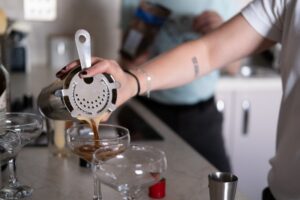
Everyone has an evening ritual. For some, it’s a long hot shower before reading a book in bed, and for others, it’s nodding off on the couch with their beloved pet. Many look forward all day to having an alcoholic beverage to soothe their nerves and make it easy for them to fall asleep. Unfortunately, unlike the previous two examples, this last one can wreck someone’s rest, especially if they have sleep apnea. Is your nighttime cocktail making your mornings worse?
Alcohol Is Bad for Sleep
Many people are surprised when they find out that drinking alcohol too close to bed can be detrimental to their sleep. It helps them fall asleep, and for some, they actually rely on it for this reason.
The issue is that sleep is a defined biological process that your body has to go through every night in order to stay functional and healthy, but alcohol doesn’t lead to sleep—it sedates someone. Sedation is a depression of all of the body’s various systems. Yes, it makes going unconscious easier, but it prevents the restorative parts of sleep that are essential for someone’s physical and mental well-being. That’s why (among other factors) people often feel extremely tired in the morning even if they slept quite a bit after drinking.
How Alcohol Makes Sleep Apnea Worse
A person with sleep apnea stops breathing several times throughout the night for 10 seconds or less, preventing them from going through the complete sleep cycle. As a result, they wake up feeling groggy and exhausted as opposed to restored and energized.
These breathing interruptions often stem from the tongue falling into the back of the throat, and the upper airway can collapse on itself as well, making it obstructed. Drinking alcohol too close to bed makes the muscles in the throat more prone to over-relaxing, causing sleep apnea to be more likely or become worse. The airway being compromised following alcohol is demonstrated by the fact that many people only snore after they have been drinking—snoring is the sound that’s made when the airway is becoming blocked!
A Better Option
If you rely on alcohol to wind down and fall asleep, changing up your bedtime routine is paramount. However, if you still feel tired all the time despite doing this, then you may be dealing with sleep apnea. Professional treatment is the fastest and most effective way to get the condition under control.
While CPAP therapy is the most popular option, more patients are opting for oral appliance therapy these days because it’s more comfortable and flexible. Plus, all you need to do is visit a sleep dentist to get it. By cutting down on alcohol in the evening and wearing a small, custom-made appliance, you’ll start getting the quality rest you deserve, leading to better mornings and better days. You don’t have to quit drinking altogether—just try to take your last sip about three to four hours before bed!
About the Author
Dr. Jeff Rodgers is an expert in sleep dentistry who has been practicing for over 25 years. He earned his dental doctorate at the University of Alabama School of Dentistry and began taking advanced courses in sleep dentistry to master the use of oral appliances to help people dealing with snoring and sleep apnea. Call (770) 394-4310 to schedule a sleep apnea consultation at Sleep Better Georgia or visit the website to learn more.
